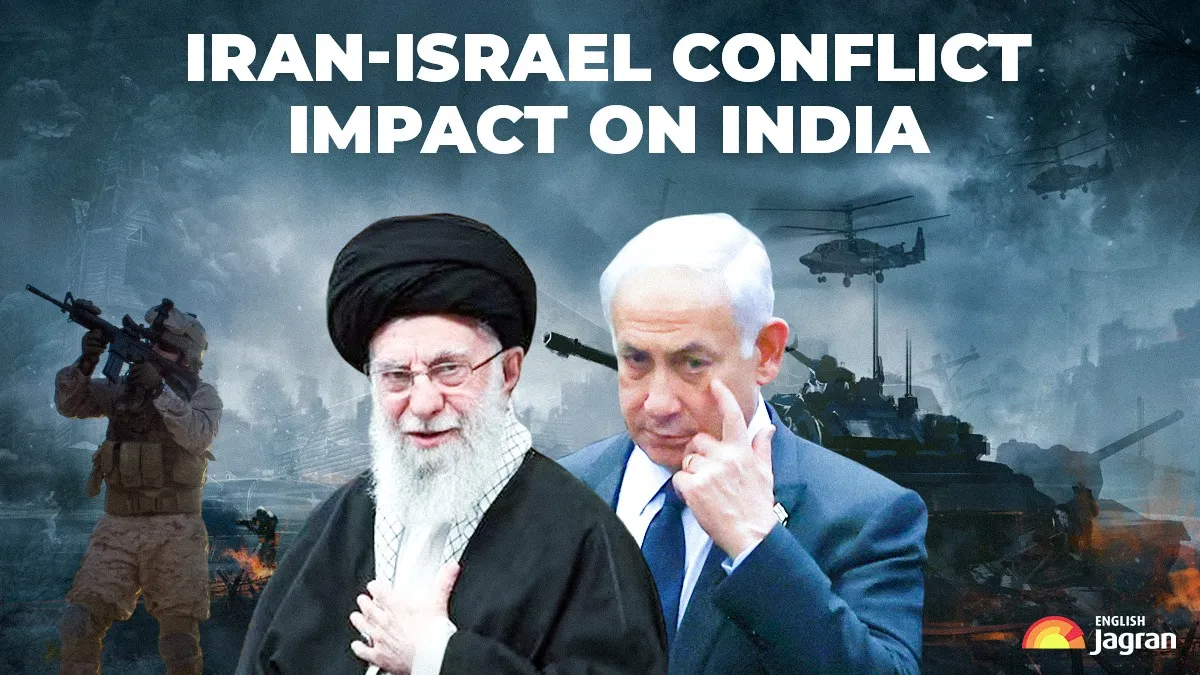- By Talibuddin Khan
- Sat, 05 Oct 2024 02:51 PM (IST)
- Source:JND
Israel-Iran War: The tensions between Israel and Iran escalated after Tehran launched almost 200 ballistic missiles on Israel. While Israel claimed that Iran would have to pay a heavy price for the attack, Iran reaffirmed that it would not hesitate to further intensify the attacks if Israel did not stop striking Lebanon. If the situation worsens, the impact of the crisis will go beyond the boundaries of the Middle East.
What Is India's Status Of Trade With Israel And Iran?
India imports saturated methanol, petroleum bitumen, inorganic/organic chemicals, almonds, etc from Iran. If the conflict between Iran and Israel escalates further, prices of these commodities may witness a surge. In terms of exports, India majorly exports Basmati rice, tea, sugar, fresh fruits, drugs/pharmaceuticals, soft drinks other than sharbat, boneless bovine meat, and pulses to Iran. A wider conflict might result in a further decline of India's bilateral trade with Iran.
As per India's Commerce Department, India's bilateral trade with Iran has been on a decline since 2019, barring FY 2022-23, when the trade between the two countries registered a growth of 21.76 per cent YOY at USD 2.33 billion. During the period, India’s exports to Iran were USD 1.66 billion and India’s imports from Iran were USD 672.12 million.

(Reuters Image)
In the current fiscal year from period April 2023-July 2023, bilateral trade with Iran stood at USD 660.70 million. During the period, Indian exports amounted to USD 455.64 million and Indian imports amounted to USD 205.14 million.
Year | India’s Exports to Iran | India’s Imports from Iran | Total Trade | Growth Rate (%) |
2019-20 | 3.38 | 1.39 | 4.77 | |
2020-21 | 1.77 | 0.33 | 2.10 | -55.9 |
2021-22 | 1.45 | 0.46 | 1.91 | -9 |
2022-23 | 1.66 | 0.67 | 2.33 | 21.6 |
April 2023- July 2023 | 0.45 | 0.21 | 0.66 | -23.32 |
In contrast to Iran, India's trade with Israel has witnessed a sharp increase in the last five years. While India exports diesel, diamonds, aviation turbine fuel, and Basmati rice to Israel, primary imports from Israel include space equipment, diamonds, potassium chloride, and mechanical appliances.
However, the trade between the two countries has been witnessing a slump in the current fiscal (FY 2023-24), declining from USD 10.77 billion in 2022-23 to USD 6.53 billion in 2023-24. The decline has been attributed to the conflicts Israel has been engaged in since October 7 2023.
If the conflict between Israel and Iran widens, India's bilateral trade with Tel Aviv may witness a further decline, with an increase in prices of imported commodities, mainly diamonds and mechanical appliances.
Iran-Israel Conflict: Impact On Indian Trade
Trade and Shipping: The ongoing conflict is disrupting important shipping routes used for India's trade with Europe, the US, Africa and West Asia. The Red Sea and Suez Canal, which handle goods worth over USD 400 billion every year, are especially crucial. The instability in these regions is not only threatening the safety of these routes but also affecting global maritime trade.
Decline in Exports: Indian exports have already felt the impact of the conflict. As per government data, India's exports dropped by 9 per cent in August 2024, mainly due to the Red Sea crisis. Europe is a major buyer of these products, accounting for 21% of India’s petroleum exports. India's tea industry is also at risk since Iran is a key market for Indian tea.

(Reuters Image)
Higher Shipping Costs: Due to longer shipping routes caused by the conflict, shipping costs have been witnessing an increase. This has put pressure on Indian exporters, dealing in textiles, and garments. Rising logistics expenses are hurting exporters’ profit margins, forcing them to rethink pricing and operations to remain competitive.
Iran-Israel Conflict: Impact On Oil Prices In India
Globally, oil prices this week surged amid escalating tension between Iran and Israel. However, the surge in crude oil prices is not likely to impact India majorly as the country imports oil from almost 40 countries, including Russia, Iraq, Saudi Arabia, the USA and Abu Dhabi, and it's not overly dependent on Iran for oil purposes.
However, the conflict could have increased volatility in global oil markets. According to MK Surana, former chairman of Hindustan Petroleum Corporation Limited (HPCL), a significant rise in crude oil prices, especially above USD 80 per barrel, would depend on how the conflict unfolds. If it escalates and disrupts key supply routes like the Strait of Hormuz oil prices could see sharp increases.

(Reuters Image)
According to a report by PTI, the Finance Ministry is keeping a close eye on the situation in West Asia but remains unconcerned about rising crude oil prices. Ministry sources stated that the government has measures in place to handle oil price volatility. They added that India has faced much higher crude oil prices in the past, and current prices have not yet reached those levels.
